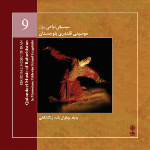- artist:Various Artists
- release year:2005
- style(s):Folk
- country:Iran
- formats:Audio File / Digital, CD (Compact Disc)
- record posted by:Mahoor Institute of Culture and Arts
- label:Mahoor Institute of Culture and Arts
- publisher:Mahoor Institute of Culture and Arts
- buy this record
Music and Possession in Baluchistan
The repertoire of the music of Baluchistan could be divided into three major categories: (a) artistic music, such as sowt, nâzing, etc, and the most important part of it, shervandi music, comprises of epic and zahirik music and Sufi ghazals (always in persian), that could be classified as classical music; (b) religious music inspired by Sufi doctrines, including zekrs and verds of Qaderi and Refâ'i dervishes and also repertoire of Cheshti dervishes; (c) music of guâti ceremonies or Qalandari-Guâti music.
Guâti (or Qalandari-guâti) music is specific to the ceremonies of healing the person who is possessed by a supernatural being, and shows symptoms of sickness. Baluchi people interpret the healing process as follows: a person (most of the time a woman) becomes sick and all the efforts of the traditional healer and mollah to cure her are in vain. Patient's relatives, after trying all the possible ways of treatment - and becoming disappointed - take her to a spirit expert (or khalife). These spirits are guâts, djins and paries that disturb people for some reasons and make them sick. If someone is possessed by one of these creatures, the only solution is talking to guât and persuading him to let the possessed person alone. In order to do that, a healing ceremony must be held, where music plays an important role.



